In the digital age, accessing academic resources and research materials has become essential for students, researchers, and professionals.
While Scribd is a popular platform for document sharing, many users seek alternatives that provide legitimate access to academic content.
This comprehensive guide explores the best legal alternatives to Scribd, offering step-by-step instructions for accessing quality academic resources without compromising ethics or copyright laws.
Why Look for Scribd Alternatives?
Before diving into alternatives, it’s important to understand why users might seek other options.
While Scribd offers a subscription service for legitimate access to content, users often look for:
- Free access to academic materials
- Specialized academic databases
- Open access resources
- Library partnerships and institutional access
- Subject-specific collections
Top Legal Alternatives to Scribd
1. Google Scholar: The Academic Search Giant
Google Scholar stands as one of the most comprehensive academic search engines available for free.
Google Scholar enables you to search specifically for scholarly literature, including peer-reviewed papers, theses, books, preprints, abstracts and technical reports from all broad areas of research.
Step-by-Step Guide to Using Google Scholar:
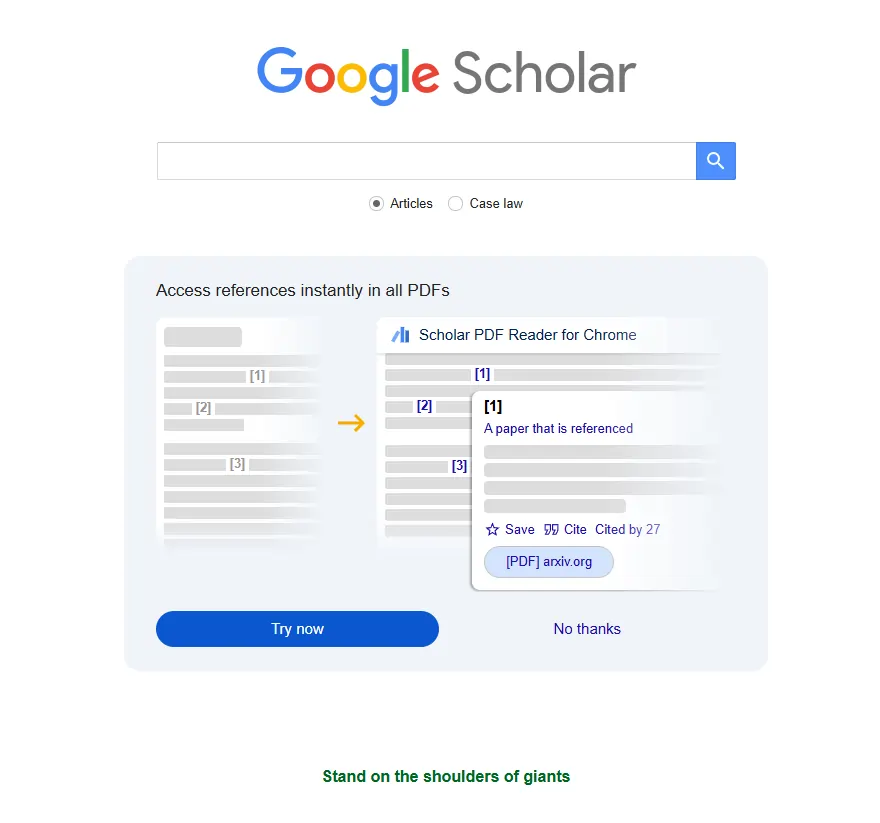
- Visit Google Scholar at scholar.google.com
- Enter your search terms in the search bar using relevant keywords
- Use advanced search features by clicking the menu icon (three lines) for more refined results
- Filter results by date, author, or publication
- Access free PDFs by looking for PDF links on the right side of results
- Set up alerts to receive notifications when new papers matching your keywords are published
- Create a profile to track your citations and organize your research
Pro Tips for Google Scholar:
- Use quotation marks for exact phrases
- Add “filetype:pdf” to find downloadable PDF versions
- Use the “cited by” feature to find related research
- Check multiple versions of papers using the “all versions” link
2. JSTOR: Academic Journal Archive
JSTOR is a digital library of academic journals, books, and primary sources. It offers both free and subscription-based access to millions of academic articles.
Step-by-Step Guide to Accessing JSTOR:
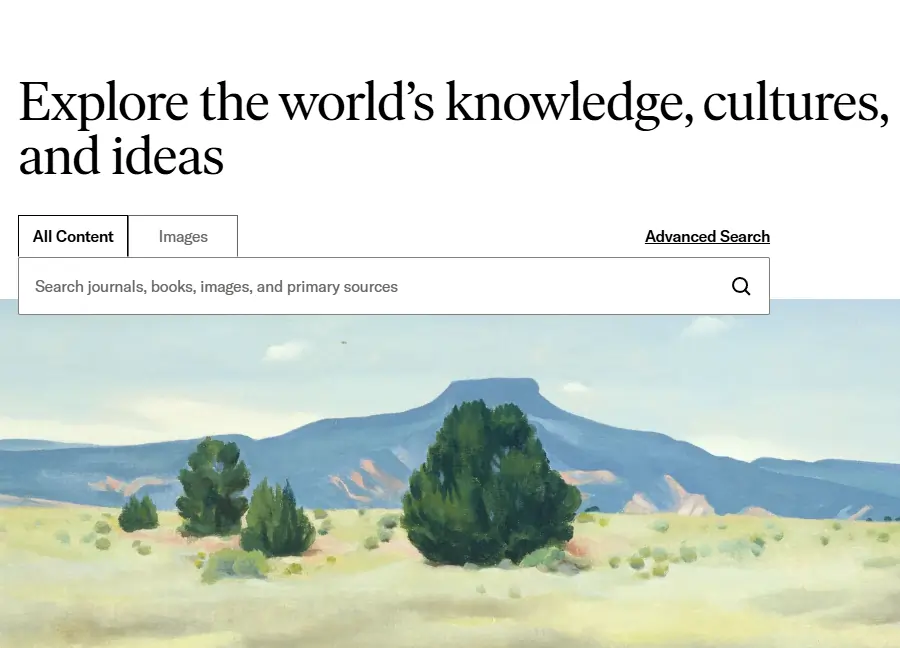
- Visit JSTOR.org and create a free account
- Browse free content available without subscription
- Use your library card to access full content if your library has a JSTOR subscription
- Search by subject using the browse feature
- Use advanced search to narrow results by date, content type, or discipline
- Save articles to your personal workspace for later reference
- Export citations in various formats for your research
Free Access Options:
- Register for free access to select articles
- Use through your local library’s digital resources
- Access through your educational institution
3. Project Gutenberg: Free Literary Resources
The best Scribd alternative is Project Gutenberg, which is free. This platform offers over 60,000 free eBooks, particularly focusing on works in the public domain.
Step-by-Step Guide to Project Gutenberg:
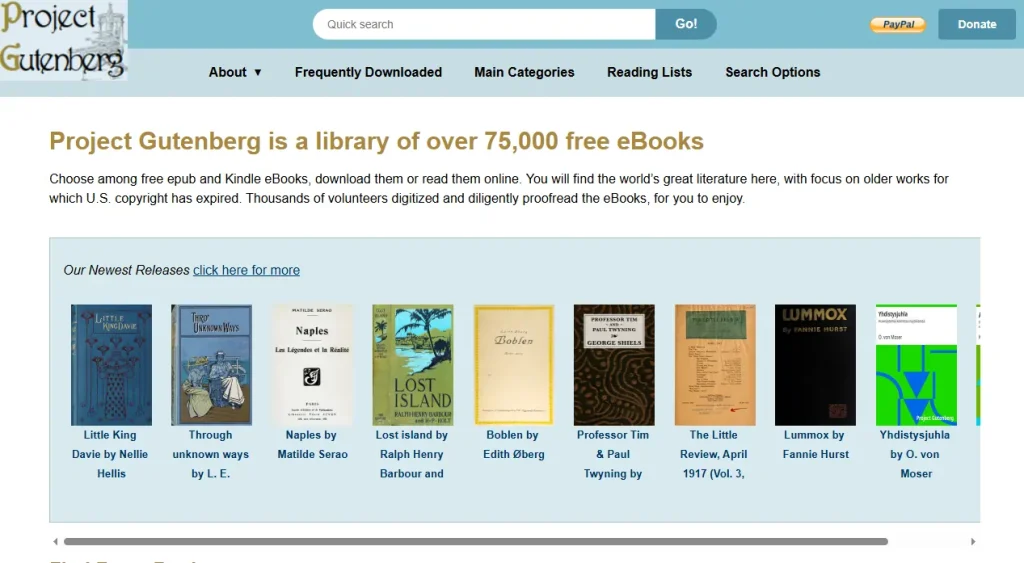
- Visit gutenberg.org
- Browse by category including recently added books, popular downloads, or by subject
- Search for specific titles using the search function
- Choose your format (HTML, EPUB, Kindle, PDF)
- Download directly to your device
- Use the mobile app for convenient reading on smartphones and tablets
4. PubMed Central: Medical and Life Sciences Database
The National Library of Medicine, part of the U.S. National Institutes of Health, runs PubMed Central. Founded in 2000, the database includes academic scholarship dating back to the 18th century.
Step-by-Step Guide to PubMed Central:
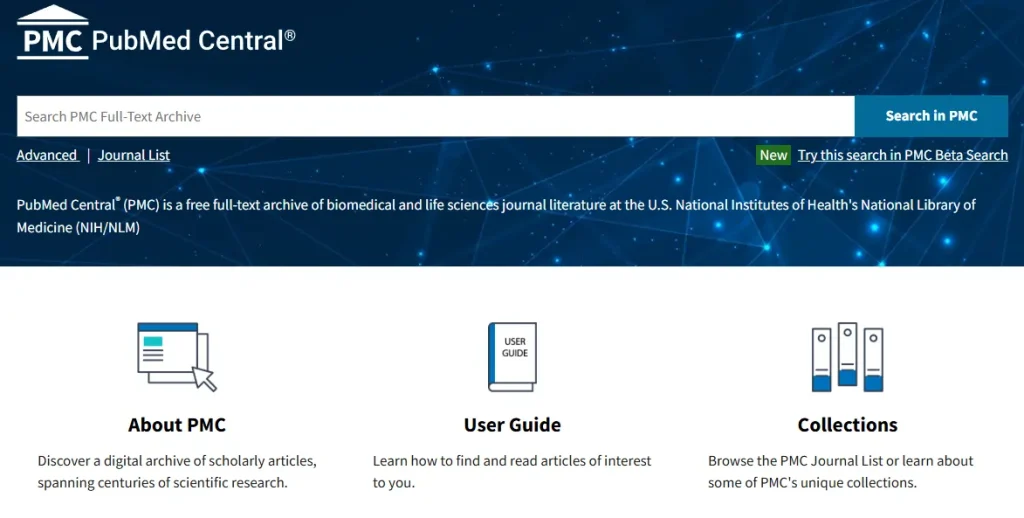
- Access PubMed Central at ncbi.nlm.nih.gov/pmc/
- Use the search bar to enter medical or life science terms
- Filter results by article type, publication date, or subject
- Access full-text articles available for free
- Save searches to receive updates on new publications
- Use MeSH terms for more precise medical searches
- Export citations for your reference management system
5. Directory of Open Access Journals (DOAJ)
DOAJ provides access to high-quality, peer-reviewed open access journals across all disciplines.
Step-by-Step Guide to DOAJ:
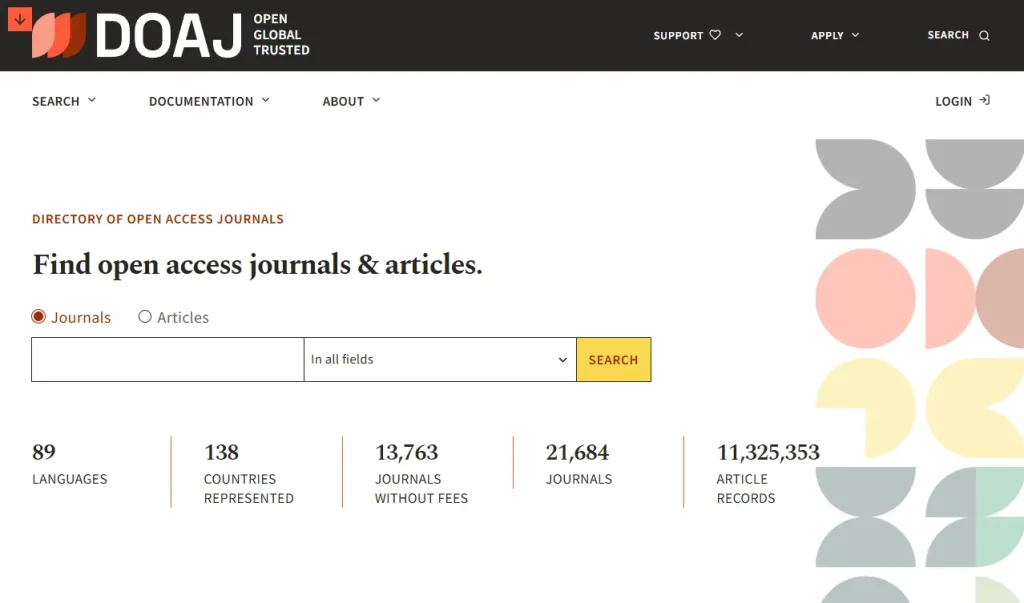
- Visit doaj.org
- Browse by subject or use the search function
- Filter by country, language, or publisher
- Access full-text articles directly from journal websites
- Use the API for researchers needing bulk access
- Subscribe to alerts for new journal additions
6. ResearchGate: Academic Social Network
ResearchGate combines social networking with academic publishing, allowing researchers to share their work and collaborate.
Step-by-Step Guide to ResearchGate:
- Create a free account at researchgate.net
- Complete your academic profile with your institution and research interests
- Search for papers by title, author, or keyword
- Request full-text access from authors when papers aren’t freely available
- Follow researchers in your field of interest
- Join discussions and Q&A sessions
- Share your own research to increase visibility
7. Internet Archive: Digital Library
The Internet Archive offers millions of free books, movies, music, and websites, including many academic texts.
Step-by-Step Guide to Internet Archive:
- Visit archive.org
- Navigate to “Books” section
- Search for specific titles or browse by subject
- Use filters to find books available for borrowing or permanent access
- Create an account to borrow books for limited periods
- Download available texts in various formats
- Explore the Wayback Machine for historical web content
8. Semantic Scholar: AI-Powered Academic Search
Semantic Scholar uses artificial intelligence to help researchers find relevant papers more efficiently.
Step-by-Step Guide to Semantic Scholar:
- Visit semanticscholar.org
- Enter your research query in the search bar
- Use the influence and citation metrics to assess paper importance
- Explore the visual paper summary for quick insights
- Set up alerts for new papers in your research area
- Use the API for advanced research applications
- Access the mobile app for research on-the-go
9. OpenDOAR: Directory of Open Access Repositories
OpenDOAR provides access to thousands of open access repositories worldwide.
Step-by-Step Guide to OpenDOAR:
- Visit opendoar.org
- Search by country, subject, or repository name
- Access institutional repositories directly
- Browse by content type (articles, theses, books)
- Use the statistics to understand repository coverage
- Set up searches across multiple repositories
10. Library-Based Digital Resources
Many public and university libraries offer extensive digital resources that can serve as excellent Scribd alternatives.
Step-by-Step Guide to Library Resources:
- Visit your local library website
- Register for a library card if you don’t have one
- Access the digital resources section
- Browse available databases such as:
- EBSCOhost
- ProQuest
- Gale Academic OneFile
- SAGE Knowledge
- Use remote access with your library card number
- Download the library app for mobile access
- Attend library workshops on research techniques
Advanced Research Strategies
Combining Multiple Sources
To maximize your research effectiveness:
- Start with Google Scholar for broad topic exploration
- Use specialized databases for in-depth research
- Cross-reference findings across multiple platforms
- Save and organize resources using reference management tools
Setting Up Research Alerts
Most platforms offer alert systems:
- Create keyword-based alerts on multiple platforms
- Set up author alerts for researchers in your field
- Configure journal alerts for specific publications
- Use RSS feeds to aggregate updates
Managing Your Research
Best Practices:
- Use citation management tools like Zotero, Mendeley, or EndNote
- Create organized folder structures for different projects
- Maintain a research log with search terms and sources
- Regular backup of downloaded materials
Legal and Ethical Considerations
When accessing academic resources, always:
- Respect copyright laws and usage terms
- Acknowledge sources properly in your work
- Use institutional access when available
- Support open access initiatives when possible
- Report broken links to help maintain databases
Conclusion
While Scribd remains a popular platform for document sharing, these legal alternatives provide comprehensive access to academic resources without ethical concerns. Free articles can be found through free online academic journals, OA databases, or other databases that include OA journals and articles.
By utilizing these platforms and following the step-by-step guides provided, researchers, students, and professionals can access high-quality academic content while supporting the principles of open access and ethical research practices. The key is to diversify your sources, understand each platform’s strengths, and develop effective search strategies that maximize your research potential.
Remember that the best approach often involves combining multiple resources and staying updated with new developments in open access publishing. These alternatives not only provide legal access to academic content but also often offer superior search capabilities and specialized collections that can enhance your research experience beyond what traditional document-sharing platforms provide.


